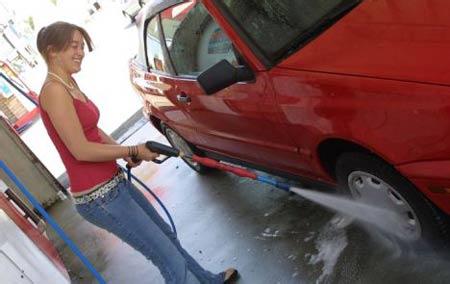摘要:今日发布的一份汽车协会调查显示,有钱的驾驶者太优雅了,优雅得连车都懒得洗。
The less high-profile your job, the cleaner your car, a survey from AA has revealed.
Wealthier motorists are ‘too poshto wash’ their cars, an AAsurvey reveals today.
They are more willing to drive dirtier vehicles for longer than poorer but prouder owners who prefer to keep their cars clean.
Only one in 17 car owners from professional and managerial backgrounds wash their vehicle once a week, reveals the survey. That compares with one in 12 among lower-income motorists, which includes manual and part-time workers.
Overall, a grubby3 percent of the 18,080 AA members surveyed admitted to washing their cars just once a year or not at all. Among women drivers, this figure doubled to 6 percent.
The survey showed that drivers in Scotland and North-East England have the cleanest cars, with 11 percent of owners washing them every week. This compares to just 4 percent in London and South-West England.
But the clean-car gap widens even more among those who clean their car twice a week.
Some 1 in 6 of lower-income owners wash their vehicle fortnightly, but only around 1 in 8 (11.5% ) of wealthier owners do so.
The AA report notes: ’Professionals and managers prefer more to wash their cars every couple of months.’
Some 35.5 percent of professionals and 29.5 percent of managers say this is the regular wash cycle for their cars.
Nearly half of all drivers wash their cars every couple of months or every six months.
And across the age bands, young drivers are put to shame by older motorists. Only half as many younger drivers washed their car once a fortnight or weekly (22 percent) compared with those aged over 55 (44 percent).

AA president Edmund King said: ’Many drivers do take pride in their cars and their Sunday morning car wash has become a ritual.
But our study suggests that you don’t need a Rolls Royce to show pride in your car.
‘The Victorian concept of the ‘great unwashed’ perhaps needs to be reversed as richer drivers have dirtier motors.’
今日发布的一份汽车协会调查显示,有钱的驾驶者太优雅了,优雅得连车都懒得洗。
他们更愿意长时间地开脏车,而不那么富有却更为其座驾自豪的车主则更喜欢保持车辆清洁。
调查揭示,从事专业和管理岗位的车主当中,每17人中只有1人一星期洗一次车。相比之下,那些收入较低的车主(包括体力劳动者和兼职工作者在内)每12人中就有1人一周洗一次车。
总体来看,18080位汽车协会会员中有3%的邋遢车主承认他们一年才洗一次车,或从来不洗车。在女性车主中,这个数字翻倍至6%。
该调查显示,苏格兰和英格兰东北部车主的车最干净,11%的车主每周都洗车。而在伦敦和英格兰南部,只有4%的车主每周洗车。
不过,洗车差距在每两周洗一次车的人当中更加明显。
大概每6个低收入车主中有1人每两周洗一次车,但每8个有钱车主中只有1人(约11.5%)每两周洗一次车。
汽车协会的报告指出:“专业人士和管理人员更喜欢隔几个月洗一次车。”
约35.5%的专业人士和29.5%的管理者说这是他们洗车的常规周期。
近半数驾驶者们隔几个月或半年才洗一次车。
而从不同的年龄段上来看,年长车主们让年轻车主们相形见绌。年过55岁的车主有44%的人每两周或者每周洗车一次,但55岁以下的车主只有22%的人这样做。
汽车协会主席埃德蒙 金说:“很多司机确实很为他们的车骄傲,对于他们而言,周日早晨洗车已经成了一种惯例。”
但我们的研究却显示,你并不需要一辆劳斯莱斯来展示你对自家车的骄傲。
“维多利亚时代‘肮脏的下层人’的说法恐怕得改一下,因为有钱的人开的车反而更脏。”
Vocabulary:posh:优雅的;第一流的
AA:Automobile Association 汽车协会
grubby:肮脏的
 爱华网
爱华网

